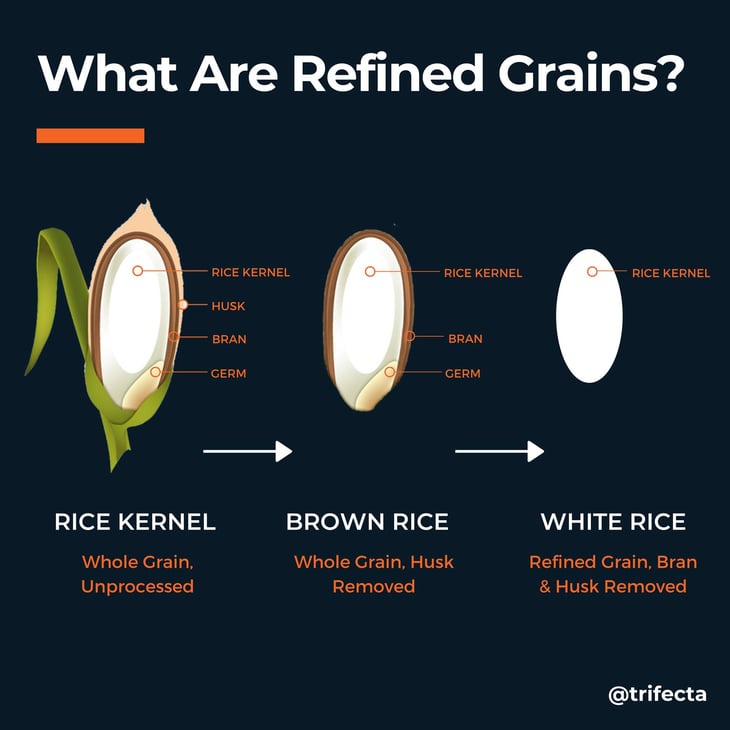All carbs seem to get a bad rap these days, but most health experts agree it's not necessarily the amount of carbs you eat that can negatively impact your health but the type. The truth is it's probably both and most of us get way too many carbs in our diet. Refined carbs or “bad carbs” are the type that tend to be more processed and high in refined sugars. But what exactly are refined carbs, are they as bad as they seem, and what foods contain them?
What Are Refined Carbs?
Refined carbs are whole grains that have been processed to remove the seed and hard exterior of the grain, resulting in a simple carbohydrate with a desirable flavor and texture.
This process of removing the bran (outer shell) andgerm (seed) from a whole grain allows food manufacturers to extract the endosperm, a soft, fluffy, and sweet interior that is used in a wide variety of foods. However, the bran and germ of the grain also tend to hold a lot of the protein, fiber, and nutrients, so when the grain is processed or refined, a lot of this nutrition is lost.

A majority of refined carbohydrates in the diet come from added sugars and processed grain products like white bread and white rice. Cane sugar is processed to produce white table sugar, whole wheat flour is processed to create white flour and brown rice is processed to create white rice.
Are Refined Carbs Bad for Your Health?
Refined carbs get a bad rap for a few different reasons:
- Lack of nutrition
- Effects on blood glucose levels
- Linked to chronic disease
Limiting your intake of heavily processed foods and added sugar makes sound sense, but avoiding all refined carbs is likely, not necessary.
Refined Carbs Are Lacking in Nutrients
Because the process of refining grains can remove a lot of nutrients, many will argue that refined carbohydrates are “bad” or less desirable for your health. However, the nutrition content depends on the specific grain and how it is used.
There is a big difference between white flour or sugars used in a heavily processed, high calorie foods compared to a serving of steamed white rice.
Additionally, many forms of white flour are often fortified to replenish the lost nutrients and in some cases fortified flours, cereal, and grains can have more nutrition than their original whole grain counterpart.
Refined Carbs Can Increase Your Blood Sugar
Diets high in sugar and low in fiber can cause some serious swings in your blood glucose levels.
Simple carbohydrates act as a quick source of energy for your body, meaning you don’t have to work very hard to get energy from them. When you eat a sugary meal, the energy is released fairly quickly into your bloodstream in the form of glucose. Too much glucose, too often can lead to high blood glucose levels or poor blood sugar control.
This can lead to energy crashes, poor appetite control, sugar cravings, and mood swings (1,2). And is especially critical for anyone trying to manage their diabetes.
Many people prefer to use the Glycemic Index (GI scale) to distinguish between complex and simple carbohydrates, but this model is somewhat flawed.
The GI scale ranks carbohydrate foods based on how they impact your blood sugar after eating them using a range of 0 to 100 (100 being the largest impact on blood glucose) (3).
But in order to truly understand a food's impact on blood sugar, you must consider how much glucose a food can deliver into the bloodstream in addition to how rapidly. In other words, just because a low-carb food can be absorbed quickly, doesn't mean it contains enough carbohydrates to spike blood sugar levels.
Using glycemic load takes into account both and tends to be a stronger measurement of a carbs impact (4).
Regardless, neither glycemic index or load consider your overall diet. Eating a high GI/GL food in a mixed dish or on occasion is likely not going to result in uncontrolled blood sugar. Having a donut for breakfast is going to impact your energy levels much more drastically than adding a little honey to your oatmeal.
As long as you maintain a macro balanced approach to healthy eating and include plenty of high fiber foods, healthy fats, and quality proteins, this is likely not something you need to be concerned about.
If you are concerned about your blood sugar control, scaling back on refined carbohydrates or total carb intake might help, but you should always check with your doctor and get regular blood tests to assess your health status first.
Eating Too Many Refined Carbs Might Negatively Impact Your Health
High sugar intake is linked to weight gain, heart disease, and type 2 diabetes (5,6,7,8,9,10,11).
Too much sugar in the diet can lead to increased blood cholesterol, a risk factor for heart disease (12). Excess sugar intake is also associated with high blood glucose and insulin resistance, which in turn could increase your risk of developing type 2 diabetes (13,14).
Additionally, because of the impacts on blood sugar and appetite, many argue that refined carbs can lead to overeating and weight gain. And they have been used in association studies to demonize sugar as the cause of the obesity epidemic.
All of these factors are why the American Heart Association (AHA) recommends limiting your added sugar intake to less than 25 grams of sugar per day.
However, it is crucial to note that sugar alone won't cause you to gain weight, only too many calories can do that. And the occasional sugary food or beverage will not destroy your health.
The Bottom Line
Weight loss and improving your health goes far beyond the type of carbohydrates you eat. However, aiming to get more “good” carbs in the right amounts can support your day-to-day nutrition needs, improve your appetite control, and support better energy levels throughout the day.
If you want to cut back on refined carbohydrates, aim to eat more whole grains and high-fiber foods, and limit your intake of empty calories and highly processed foods. And whatever you do, don't beat yourself up for the occasional splurge. All foods can fit into a healthy lifestyle!
When You Should Eat More Refined Carbohydrates
Limiting your intake of refined carbs is sound nutrition advice, but you don’t need to avoid them altogether. In fact, including some refined carbs in your diet can actually have some benefits, especially when looking at fueling your performance or in a muscle-gain diet.
Athletes or individuals who are burning through a lot of fuel in their training can benefit from the quick source of energy supplied by refined carbs. This can really help keep you going during long runs or intense workouts.
Simple carbohydrates can also help fuel your recovery after a workout by supplying nutrients to your hard-worked muscle. This is exactly why many individuals looking to gain muscle turn to simple carbs including white rice, pasta, and bread as part of their bulking diet.
Examples of Refined Carb Foods to Know
The easiest way to identify refined carbohydrates in your diet is to identify the processed foods you are consuming. The majority of “good” carbohydrates are going to come from nutritious whole foods that look similar to how they are found in nature, whereas processed and refined carbs are most commonly found as ingredients in packaged foods and beverages. Checking the ingredients list of the foods you eat is also a great tactic.
Here are some of the most common types of refined carbs in our food supply.
Added Sugars
Nearly all added sugars can be considered refined carbohydrates - with the exception of less processed sugars like honey, maple syrup, agave, raw sugar, and coconut sugar.
It can be challenging to identify all the different types of refined sugar in your food because there are over 50 different names and types used by food manufacturers. Typically if it ends with sugar, syrup, or -ose, it is a safe bet it is some form of sugar. You can also check the nutrition facts label to see if added sugar is called out directly.
The most commonly used refined sugars in processed foods include:
- Sugar (sucrose)
- Corn syrup
- Fructose
- High fructose corn syrup
- Brown rice syrup
- Glucose
- Maltose
- Dextrose
However, it is important to note that all sugars, refined or “natural” provide the same amount of calories and carbohydrates per serving and have similar effects on blood sugar. And if you are looking to limit your intake of refined carbohydrates, it is worth considering minimizing sugar intake altogether.
Juice and Soda
Any sweetened beverage is going to be incredibly high in added sugar. In fact, a single bottle of soda contains over 50 grams. These drinks also tend to be a source of empty calories in the diet and can contribute to weight gain when you overdo it.
Common sugary beverages include:
- Sweetened tea and coffee drinks
- Soft drinks
- Lemonade
- Flavored fruit drinks
- Energy drinks
- Sports drinks
One could also argue that fruit juice is a refined carb since it is the sweet, sugary interior of fruit extracted from the fibrous, nutrient-rich skin and pulp. Although 100% juice tends to still contain some water-soluble nutrients like vitamin C.
White Breads and Grains
Refined grains are whole grains that have been processed to remove the hard outer layer and germ, resulting in a fluffy, carbohydrate-rich end product. These simple grains include:
- White bread and rolls
- White rice
- Pasta
- Flour tortillas
- Plain bagels
- White crackers
- Sugary cereal
Pastries and Desserts
Another obvious source of refined carbohydrates are pastries and desserts. Just about any typical dessert or baked good on the planet contains some amount of sugar and white flour, so they are going to be high in refined carbohydrates overall.
Some examples include:
- Cookies
- Pie
- Cake
- Donuts
- Ice cream
Calculate Your Daily Carbohydrate Needs
Looking to get your diet on point? Learn exactly how many grams of carbohydrates you need each day, use this simple calculator.



